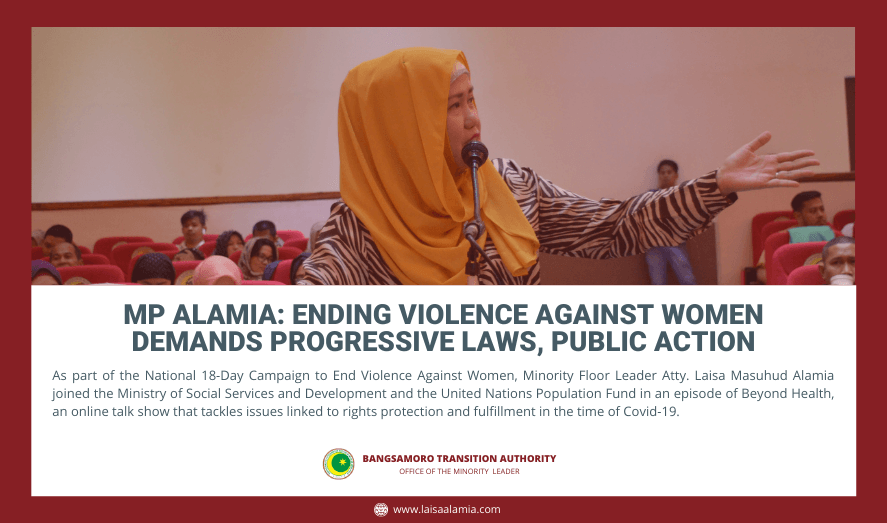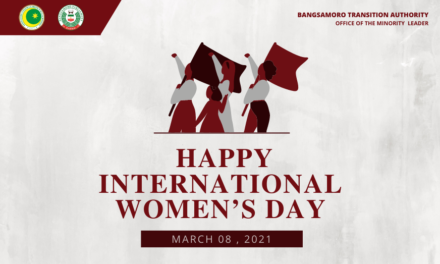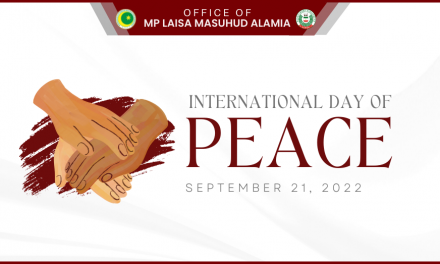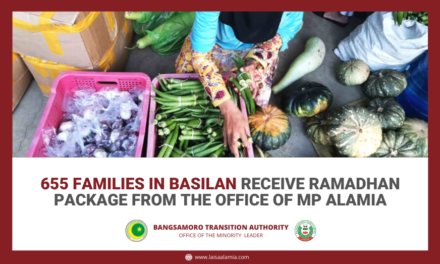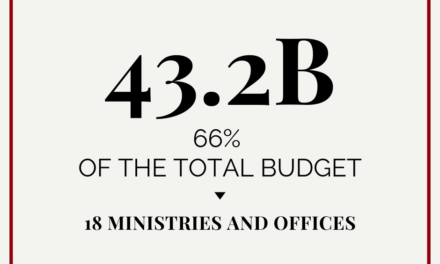Based on the 2017 National Demographic and Health Survey released by the Philippine Statistics Authority, about one in four women aged 15 to 49 have experienced physical, sexual, or emotional violence in the hands of their husband or partner. While this statistic on violence against women is already alarming enough on its own, government authorities say that these numbers have risen since quarantine measures started in March of this year.
As part of the National 18-Day Campaign to End Violence Against Women (VAW), Minority Floor Leader Atty. Laisa Masuhud Alamia joined the Ministry of Social Services and Development and the United Nations Population Fund in an episode of Beyond Health, an online talk show that tackles issues linked to rights protection and fulfillment in the time of Covid-19.
The Philippines has a wide range of laws that uphold and protect the rights of women, including specific provisions in the 1987 Constitution. This includes Article 14, Section II where the state “recognizes the role of women in nation-building, and shall ensure the fundamental equality before the law of women and men.” The Philippines is also a signatory to international treaties that uphold women’s rights, while also participating in gender mainstreaming and the protection of women’s and girls’ rights in the region through networks such as the ASEAN Committee on Women (ACW) and the ASEAN Commission on the Promotion and Protection of the Rights of Women and Children (ACWC).
But violence against women (VAW) continues to persist due to deeply-rooted issues of gender discrimination and inequality in the country, due to limited understanding of laws that uphold women’s rights.
Among these laws is Republic Act 9262, or the Anti-Violence Against Women and Their Children Act of 2004. The enactment of this law, according to MP Alamia is a “recognition and acknowledgment of women are usually left to suffer in silence, and addresses the invisible violence women experience in the privacy of their own home.”
“A lot of communities do not discuss this, but many women suffer from physical, emotional, and even economic abuse, due to the common warning directed against women whose calls for help are often dismissed as airing their ‘dirty laundry’ in public,” MP Alamia says in the episode.
“But domestic violence is very harmful,” she adds. “It can be committed in various ways, and no woman or child should have to endure that sort of violence.”
MP Alamia noted that while the public is “not legally obligated” to act on cases of VAW, they are “empowered” to take action in order to help women whom they feel are in need of help and assistance. While the law enumerates what women can do as victims of VAW, “it’s really very difficult to act alone because it depends on her level of empowerment and the presence of a strong support system,” she added.
VAW survivors do not need to act alone, however, as the law empowers state actors and any citizen “having personal knowledge of the circumstances involving the commission of the crime,” since VAW is considered a public crime. MP Alamia adds that, in the case of RA 9262, “the intention of the law is to protect not only actual victims but also potential victims.”
There are many laws that uphold women’s rights, but some of these laws were only passed fairly recently, that even the law upholding women’s suffrage was passed only 83 years ago. The Anti-Sexual Harassment Law or Republic Act 7877, on the other hand, was only passed in 1995 and is limited only to spaces of employment, education, or training environment. Fourteen years after, the Safe Spaces Act was enacted that expanded the context in which sexual harassment could be punishable, and heightened the duty of the employers, administrators, and the government to discourage such harassment. Given this, MP Alamia emphasized the need to continuously assert these rights in the public sphere and to support women when they issue calls for gender justice.
The Beyond Health episode featuring MP Laisa Alamia may still be accessed on the MSSD Facebook page. It is the fourth out of seven episodes that seek to highlight different topics geared towards uplifting women and ending VAW, and aired last December 4.

